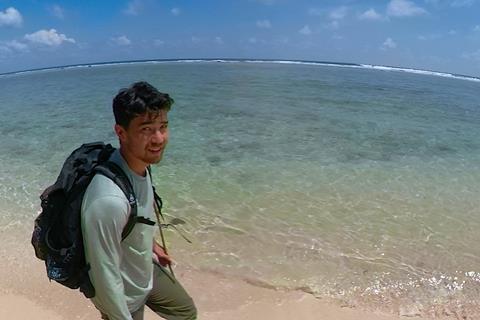Nat Geo doc traces the last fateful journey of missionary John Allen Chau to North Sentinel Island

Dirs/scr: Jesse Moss, Amanda McBaine. US. 2023. 103mins
In 2018, John Allen Chau embarked on a quest to take the word of God to the indigenous population on North Sentinel Island. Unauthorised travel to a people living in voluntary isolation is strictly prohibited – and with good reason. Chau’s body was never found. The Mission is a thoughtful, fair-minded exploration of what motivated Chau, and also spreads out to confront bigger questions on the legacy of colonialism, the delusions of white saviour narratives and the thin line between faith and fantasy.
The directors convey the stereotypes of classic adventure yarns where gung-ho white men undertake disastrous intrusions into cultures they do not understand
This latest work from Boys State (2020) directors Jesse Moss and Amanda McBaine is an intriguing, multifaceted documentary. The combination of ethical issues with a stranger than fiction tale should entice audiences when this National Geographic documentary is released theatrically in the United States on October 13, with digital and broadcast set for later in the year. US director Justin Lin is at work on a feature film on the same subject, put on hiatus at the final hour due to strike action.
Chinese-American Chau was an evangelical Christian raised on romantic notions of travel, exploration and missionary work. This is someone who loved ’Tin Tin’, the Narnia chronicles and a thousand boy’s own adventures. In The Mission, Chau’s perspective comes directly from diaries provided by the family after his reported death, while actor Lawrence Kao speaks his words in the narration.
The sense of who Chau was and his determination are established through these diaries, his social media posts and interviews with friends, family and colleagues (although a clearer identification of interviewees would have been helpful.) Chau was just 26 when he died; a cheerful, athletic, outdoors person, he ran marathons, climbed mountains and hiked through woodland trails. He was also a man who believed in the absolute necessity of spreading the gospel. It almost seems as if it was an offence to him that there could be a part of the world where the population had not been given the chance to embrace Christianity. The Sentinelese represented a particular challenge as they tend to discourage interfering visitors with sharp spears and bows and arrows. “Is this island Satan’s last stronghold?” he wonders.
A poignant element of the film is a letter provided by Patrick Chau, John’s father. Voiced by David Shih, his words reveal a man who is also Christian but not evangelical. There are feelings of guilt and regret at his inability to prevent his son from embarking on his ill-advised mission. There is no aspect of the film that gives voice to his mother’s perspective, however, and more of the family story would have been welcome.
Moss and McBaine successfully combine a wide range of images, animation, archive footage and mixed aspect ratios. Chau’s story is substantially conveyed in animated sequences, directed by Jason Carpenter, that have some of the rich look of the comic book adventures that Chau might have watched as a youth. Excerpts from King Kong (1933), Bunuel’s Adventures Of Robinson Crusoe (1954) and Cannibal Island (1956) add a more lighthearted element to a serious-minded work, as the directors convey the stereotypes of classic adventure yarns where gung-ho white men undertake disastrous intrusions into cultures they do not understand. There is even more criticism of the part National Geographic itself may have once played in romanticising remote areas and ’primitive’ tribes.
Around the story of Chau, we also encounter Indian anthropologist T N Pandit, the only man to visit the waters of the Sentinel Island and live to tell the tale; historian Adam Goodheart; the story of British naval officer Maurice Vidal Portman and his documenting of Andanamese tribes; and, most intriguingly, Daniel Everett, who went to live with the Piraha people in the Amazon basin and wound up losing his faith rather than converting them. In most cases there is the common conclusion that where white men go, disaster inevitably follows.
The film takes the question of faith seriously. Fellow evangelicals find inspiration from a man willing to sacrifice his life to follow God’s wish and spread the word. He is celebrated as a firebrand who dared to go where others feared to tread. Others mourn the loss of a son, a friend and someone whose infectious but undeniably naive idealism cost him dearly. Different views are given equal respect, leaving the viewer with plenty to ponder.
Production companies: Lightbox, Mile End Films
Worldwide distribution: National Geographic Documentary Films
Producer: Jonathan Chinn, Simon Chinn, Jesse Moss, Amanda McBaine, Will Cohen
Cinematography: Thorsten Thielow
Editing: Aaron Wickenden
Music: Danny Benz, Saunder Jurriaans















![[L-R]: Amanda Villavieja, Laia Casanovas, Yasmina Praderas](https://d1nslcd7m2225b.cloudfront.net/Pictures/274x183/6/4/1/1471641_pxl_20251224_103354743_618426_crop.jpg)








